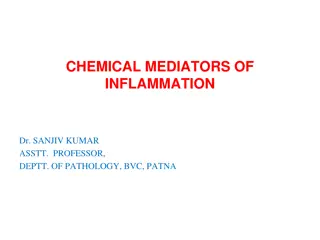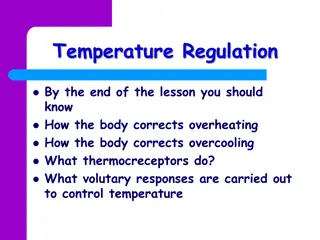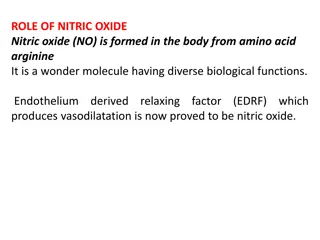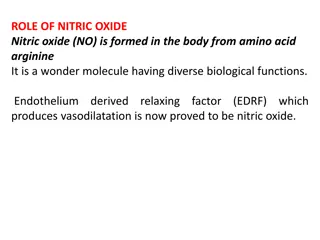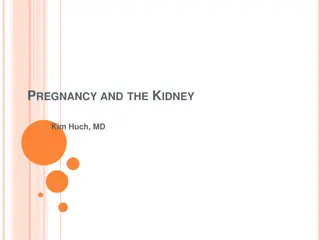Overview of Chemical Mediators of Inflammation and Their Roles
Chemical mediators of inflammation act on blood vessels and cells to contribute to an inflammatory response. These mediators include vasoactive amines like histamine and serotonin, plasma proteases such as the complement, kinin, and clotting systems, and important inflammatory mediators like C3a and
1 views • 24 slides
Understanding Body Temperature Regulation
Explore how the body maintains its internal temperature through mechanisms such as correcting overheating and overcooling, the role of thermoreceptors, and voluntary responses that help control temperature. Discover the importance of regulating internal body temperature for optimal enzyme-catalyzed
2 views • 18 slides
Understanding Cutaneous Circulation and Blood Supply in Different Body Regions
Cutaneous circulation plays a vital role in supplying blood to the skin, with variations in apical and non-apical regions of the body. The blood flow is regulated by neural, thermal, and metabolic factors, and controlled by sympathetic fibers. Sympathetic vasoconstriction and vasodilation affect the
0 views • 19 slides
Role of Nitric Oxide in the Body: Functions, Formation, and Clinical Aspects
Nitric oxide (NO), a vital molecule formed from arginine, plays diverse roles in the body including vasodilation, neurotransmission, platelet regulation, and immune response. Its formation involves a complex enzyme called nitrogen oxide synthase. Various inhibitors and clinical implications, such as
0 views • 19 slides
Understanding Homeostasis in Organisms
Homeostasis is the key to maintaining internal stability in living organisms, ensuring they return to a stable state after fluctuations. This involves various body parts such as the kidneys, skin, liver, and pancreas. Different systems like body temperature regulation, blood pressure control, and os
1 views • 51 slides
Role of Nitric Oxide in Biological Functions and Health
Nitric oxide (NO), a vital molecule formed in the body from arginine, plays diverse roles such as vasodilation, neurotransmission, platelet inhibition, and immune response mediation. It is essential for regulating blood flow, maintaining blood pressure, and muscle relaxation. Various inhibitors impa
0 views • 26 slides
Pregnancy and the Kidney: Physiological Changes and Considerations for Chronic Kidney Disease
GB, a 28-year-old woman with a history of FSGS, seeks advice on pregnancy. Physiological changes in pregnancy affect renal function, including increased renal flow and volume, ureteral dilation, and systemic vasodilation. Renal hemodynamics peak in the first trimester without causing kidney damage.
0 views • 36 slides
